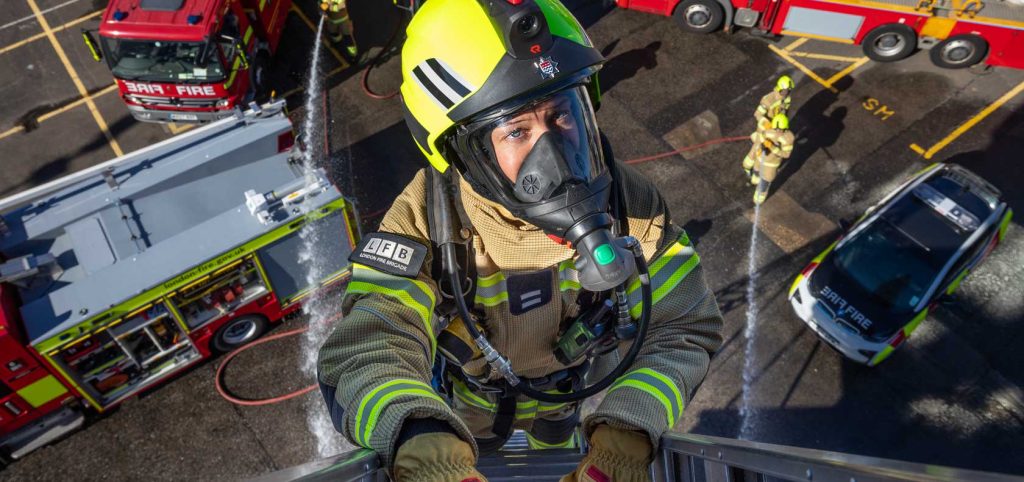Keeping cool in the heat of the moment

An extraordinary cool head
Every day, across the country there are traffic collisions, accidents in water, building fires and acts of violence. They are often life-changing, if not life-threatening. And whenever they happen, we rely on our firefighters, police officers, coastguards and paramedics to head straight into the danger, not away from it.
However extreme the circumstances, we expect our emergency services to make complex, life-protecting decisions in split seconds. We expect them to use exceptional skill and judgement. We expect them to act selflessly, always putting our lives ahead of theirs.
When the heat is truly on, we rely on our emergency services to act coolly under pressure.
How do they do it?
Every day, these brave people save us, our animals and our property. Then, they go straight out again over and over until their shift ends. How do they do it?
The job is extremely difficult, but the answer is much easier. They repeatedly make the right decisions under extreme pressure. It’s an extraordinary ability. One that’s learned the hard way.
How cool-headed are you?
Our temperament is what guides us through life. Some people are naturally calm, able to remove the emotion from a situation and deal with the facts and realities. Other people lead with their emotions, whether that’s anger, upset or panic. Some of us just freeze under extreme pressure.
Until we’re put in that kind of position, we can’t really know how we’ll react. And that’s the point.
Are you well enough prepared?
The key to most things is being ready for them. As we go through life, we become increasingly familiar with the World around us. We learn how to take sensible risks and how to avoid excessive ones. We learn to walk and drive and swim to allow us to safely do more. We teach ourselves how to live a fuller life amongst all the volatility and uncertainty we encounter.
If we always choose to stay at home, our comfort zone would become tiny and inadequate. We wouldn’t be prepared for the World outside, or for anything much at all.
However, if we always push ourselves to learn new things and face new situations every single day, we can quickly become prepared for most things. We need to venture outside our door and face the World head on.
If a job regularly puts us in high pressure environments, it will teach us how to cope in them. We might not enjoy the learning process, but the increasing familiarity will equip us to deal with the extreme conditions we have to face. We develop our abilities by using them.
What’s the secret to handling extreme pressure?
In a word ‘practice’. By exposing ourselves to increasing levels of pressure, we can build the mental strength we need to deal with them. While this may sound daunting, it doesn’t mean throwing ourselves into the deep end. By gradually increasing our exposure to pressure, we can we can increase our ability to deal with it.
Being successful requires us to become Win Ready. How many people are successful by luck or accident? Winning typically comes from meticulous preparation. Sustainable success takes much more than luck. We have to prepare for our success.

One essential aspect of success is our mentality. If we’re not focused and determined, we’re unlikely to win. If we’re not able to cope under pressure, we won’t be successful.
We require total self-control to use our total mental capacity. Any loss of control costs us some decision-making capacity. Making complex decisions becomes impossible if our mind is flooded with fear.
We have to be able reach the state of cool-headedness that allows us to function at our peak. And that comes from practice. Repeated, dedicated practice. The safe, steady easing out of our comfort zones, by stretching our abilities to their maximum.
By developing us in safe areas first, we become ready for the real thing later. By training our mind to cope with ever increasing pressure, it will be able to when the time comes. We learn how to cope by coping. Our emergency services teach themselves to make the right decisions under pressure, by practicing under increasing pressure. When they have the mental self-control to cope, they can do the job for real.
But having self-control is only half of the equation.
The other half
The more pressure and time a task takes, the more we have to want to do it. Without sufficient motivation, we’ll inevitably decide not to take a big risk. Without the passion to get the job done, we won’t put ourselves through the stress of doing it. Without truly up for it, our disinterest or discomfort will take over. If you’re not really feeling it, why bother?
Having a cool blue head is vital to managing pressure. But so is having a passionate red heart. Without a driving desire to succeed, success will remain elusive.
It’s the symbiotic relationship of red heart and blue head that helps us to maximise our human potential. It’s the essential combination that makes great decisions under pressure. If one side of the equation is under-powered the other is weakened.

Gradually exposing yourself to the stresses and strains of a job is critical to extending our comfort zone and increasing our personal performance.
And finding a cause we believe in is what provides the critical answer to “Why bother?” That sense of driving passion is what allows us to repeatedly put ourselves under that pressure. Without having both together, you usually have neither.
We rely on this combination
Our brave firefighters, police officers, coastguards and paramedics (and many others) have found the inner motivation that drives them, such as ‘saving lives’ (red heart) and developed their ability to cope under extreme pressure (blue head). We are exceptionally lucky to have them.
The attitude to development that our emergency services is of course relevant to every job.
We would thoroughly recommend Dr. Sabrina Cohen-Hatton’s excellent book ‘The Heat of the Moment’ which offers fantastic insight into the way the fire service operates.
